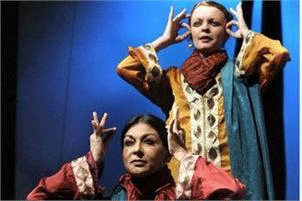
Hindustani ragas and baroque music take turns to map the journey of Orfeo, the Greek legend who travels to India in search of his beloved deceased wife Eurydice.
This journey, captured in a five-act opera "Orfeo, Crossing the Ganges", and staged here over the past three days is the brainchild of Francoise Lasserre, and has been produced by Francis Wacziarg, who conceived the idea two years ago.
"It's not a fusion or amalgamation but a conversation between the two cultures where authenticity of each is maintained. A little ornamentation and improvisation has been done to support the storyline. Francoise Lasserre is in love with this country and has a keen knowledge of both classical western music and Indian music", says Francois Rancillac, the opera's stage director.
The Indian adaptation of the opera, said to be the earliest surviving opera that is still regularly performed, retains the music and dialogues of the original production.
Created by Italian composer Claudio Monteverdi and staged first in 1607, the opera traces the journey of Orfeo to Hell to bring back his beloved wife Eurydice.
For the Indian production, the origins of Eurydice changed and Orfeo had to cross the Ganges to Varanasi to bring her back.
The opera begins with producer Francis Wacziarg narrating how Orfeo falls in love with Eurydice, a beautiful dancer consecrated to the service of Lord Shiva and how he kidnaps her and marries her, thus provoking the fury of the god.
The cobra around Shiva's neck bites Eurydice and eventually takes her life and Orfeo's struggle, longing and journey thus begins.
Odissi dancer Arushi Mudgal, who has performed globally, acts as the narrator who plays a key role in the production, which begins and ends with evocative dance.
"It's a gift to work with her, she knows her craft very well. She picks up movements from the contemporary dance and adopts as well as reinvent them flawlessly", says the director.
Arushi who plays a temple dancer in the opera, opens the show with her delicate dance movements depicting happiness and excitement.
In the opera, when Orfeo gazes at her, he is reminded of his late wife and approaches her, to which she responds in surprise and runs away.
Eventually she follows Orfeo on his journey to bring back his wife and remains invisible to everybody, including Orfeo.
"It is through my eyes, my expressions and my movements that audience is taken through this journey but I'm also discovering his world and audience also discover it with me. I travel with him, but he cant see me but a relationship that is something between love and friendship develops from my side," says Orfeo.
An the end of the opera when Orfeo dies, Arushi performs an elaborate sorrowful dance. "It depicts the agony I feel as I have developed feeling for Orfeo, and it is now that I realize that how futile it all was," she says.
Almost 50-odd artists participated in the unique production which had both Indian and international appeal as it used very rare and old instruments of the time of Monteverdi, such as the theorbo, the viola de gamba, the organ and the harpsichord.
All instruments were transported from abroad especially for the opera, the organisers say.
Indian classical music instruments like the tabla, the pakhwaj, the sarang and the shennai were also played during portions of Arushi's act in the opera, adding an Indian flavour to the ancient Greek story of love and loss.
"It is in the end really, where both the Indian story teller and the Greek one mourn the death of Orfeo, and we see coming together of both the cultures and how they express their sorrow beautifully" according to a French national who had come to see the production.
The opera has been presented in India in association with the Embassy of France and the Institut Francais en Inde with the support of the Indian Council for Cultural Relations, the Neemrana Music Foundation and the French ensemble Akademia.
The crew is set to leave for Paris next where the opera has been scheduled to be presented at the Cite de la Musique, on October 5.